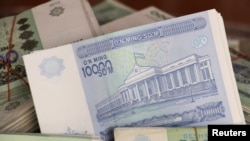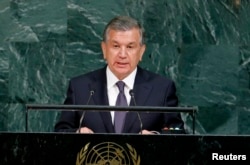Sensing change in his native Uzbekistan, Hikmat Abdurahmonov plans to build a 10-story office block and open a consultancy firm oriented towards foreign trade. In neighboring Kazakhstan, banker Umut Shayakhmetova is considering an Uzbek subsidiary.
“There is hope in the air,” she says.
Their plans, commonplace in many countries, are striking because Uzbekistan, as Shayakhmetova puts it, is “starting from zero.”
Until the death last year of former president Islam Karimov, it was one of the world’s most isolated states. Karimov, who came to power in communist times, kept an iron grip on the economy and politics and mistrusted both Russia and the West.
Since then, foreign delegations have been beating a path to the capital Tashkent, drawn by the potential of the Central Asian country’s oil and gas and vast cotton crop as well as areas such as car and food production, machinery and chemicals.
They also have political concerns: Uzbeks from a long-oppressed Muslim population have been arrested for attacks on civilians in New York, Istanbul, Stockholm and St. Petersburg this year that killed at least 65 people and wounded many more.
Top-down political system
Karimov’s successor, his longtime prime minister Shavkat Mirziyoyev, has maintained the top-down political system while starting tentative reforms to an economy that had failed to create jobs, fueling discontent.
In August, the country said it would abolish, in 2019, the exit visa system that prevented Uzbeks leaving without official permission, easing the path of millions of migrant workers whose remittances, mostly from Russia, are a vital source of income.
A month later it stopped sending students, teachers and medical workers to harvest cotton after a global boycott campaign, and scrapped most of the capital controls that had bolstered state reserves but stifled trade and investment.
For Abdurahmonov, 36, who has run property, trade, finance and other businesses and lived in the United States, Britain, China and Singapore, the currency reform means he can focus on making money instead of tracking it down in an opaque system.
“I think you can feel it in the air how the atmosphere is really changing,” he said in an interview at his three-story, loft-style office building on the eastern outskirts of Tashkent.
“People are planning new businesses, you can see a lot of start-ups coming (to us).”
'Serious’
While Abdurahmonov’s company leases out office space, arranges foreign trade deals and provides other services for local entrepreneurs, Shayakhmetova is chief executive of Halyk Bank, Kazakhstan's biggest lender by assets.
“I have had meetings with high-level officials and I have the impression they are serious (about reforms),” she said in Almaty, Kazakhstan's financial center. “We are studying the market and talking to the regulator to see what their plans are.”
Shayakhmetova said the bank, which has assets of $26 billion and units in Russia, Georgia and Kyrgyzstan, could set up a subsidiary in Tashkent in a year and a half.
The World Bank named Uzbekistan one of its top 10 improvers this year for ease of doing business, citing reforms in starting a business, construction permits, protection for minority investors, tax payments and electricity supplies.
Ranked 74 out of 190 countries, it was slightly ahead of China and Ukraine but well below Russia, which is 35th.
“Our next target is quite ambitious — we want to be in the top 20 by 2025,” Azim Akhmedkhodjaev, head of the state investments committee, said, citing a draft “Investment Code” to replace more than a hundred separate laws and regulations.
The country has not tackled the more complex and potentially painful restructuring of large state enterprises, however, or joined the World Trade Organization, and is among states perceived as most corrupt, according to watchdog Transparency International, which ranks it 156 of 176.
Ordinary Uzbeks have yet to feel the full benefits of the foreign exchange liberalization, still unable to buy foreign currency in cash except on the illegal black market.
Global outreach, Russian focus
So far this decade, Russia, China and South Korea accounted for around two-thirds of investment, with most, last year, going into oil and gas, followed by chemicals and logistics.
Akhmedkhodjaev said the country had attracted $4.2 billion so far this year, including $3.7 billion in direct investment or FDI, compared with $1.9 billion in FDI in the whole of 2016.
According to World Bank data issued before Akhmedkhodjaev spoke to reporters this month, FDI inflows fell to $67 million in 2016. He did not comment on the discrepancy.
The drop followed high-profile disputes with investors such as Britain’s Oxus Gold and Russian mobile phone operator MTS and a drop off in Chinese investment once a gas pipeline was built.
This year, France’s Peugeot announced a joint venture and Turkish firm Gentes Yapi ve Endustry Tesisleri Ltd. Sti signed a deal to build a large logistics facility.
That marked an easing of ties strained by Turkey granting asylum to a leading Uzbek opposition figure, although he and others have yet to return because, while some critics have been freed from jail, others have been detained.
Akhmedkhodjaev listed United States, Germany and Japan among investors this year, a reflection of the president’s global outreach, while the main inflow, almost a billion dollars, was expected to come from Russian energy giant LUKOIL.
Mirziyoyev has described Russia as a strategic partner, and Russian central bank data shows $2.7 billion in money transfers from Russia to Uzbekistan last year.






